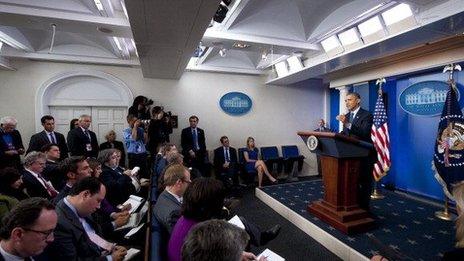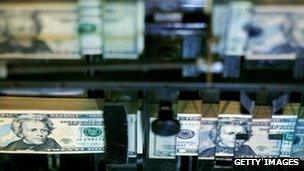Debt ceiling crisis has other nations angry and scared
- Published

Mr Obama has vowed not to negotiate terms with Republicans in Congress over a bill to raise the US debt ceiling
At the start of the current US budget standoff, other countries viewed the situation with a mix of sympathy, concern and bemusement. With the 17 October deadline for raising the debt ceiling approaching, however, the international view has changed to fear and anger.
While many abroad have considered a US government shutdown unfortunate and potentially damaging to the global economy, it is a development the world has survived before. But the last time the US came close to defaulting on a sovereign debt obligation was in 1790, when the country was a backwater ex-British colony, a bit player on the world stage.
More recent examples of sovereign default include Mexico (1982), Russia (1998), Argentina (2001) and Greece (2012). Each of those sparked global financial crises that required US intervention. It is unsurprising, then, that with the US itself possibly causing the economic conflagration, foreign observers are hitting the panic button.
'Fundamentally wrong'
"What is chilling is that US politicians are willing to engage in a game of brinkmanship that is tantamount to detonating a nuclear device over their economy," writes the Times of India, external. "A bunch of intransigent American politicians are holding not just President Barack Obama, but the entire world to ransom."
Although the enormity of the crisis has yet to sink in for many around the world, those who are paying attention are starting to call into question an American system of government that would reach this point.
"There is something fundamentally wrong with a system that leaves a country without direction, in stagnation, without a budget and potentially without the wherewithal to settle its debts," writes UAE , externalbusinessman Khalaf Ahmad Al-Habtoor in The Arab Times.
"Obama must get his own house in order not only for the sake of the American people, but also to retain his nation's revered top slot in the global economic and geopolitical hierarchy before the world concludes the US is just an aging tiger without teeth."
In 2009, Zimbabwe adopted the US dollar as an official currency in order to stanch hyperinflation and bring stability to its economy. Now, it faces a possible American financial collapse that would drag it down, too.
"If the US defaults on its debt this would result in the country's credit rating plummeting and the US dollar falling and thereby causing havoc in the international financial markets," writes the nation's Financial Gazette, external.
'Thanks, Washington'

A debt default could cause a large drop in the value of US currency.
As America's largest trading partner, Canada faces a heightened threat, as well.
L Ian MacDonald, a columnist for the Ottawa Citizen, writes, external, "This is a matter involving the good faith and credit of the United States." And because the crisis is already causing the Canadian dollar to increase in value relative to the US dollar, it is adversely affecting Canadian exports. "Thanks, Washington, we needed that," he writes.
Overseas leaders are also expressing their concerns - particularly in Japan and China, the two largest foreign holders of US national debt.
"The US must avoid a situation where it cannot pay, and its triple-A ranking plunges all of a sudden," Japan's Finance Minister Taro Aso said to Reuters, external.
"The US is the world's biggest economy and a major country issuing reserve currency," China's Vice-Minister of Finance Zhu Guangyao said, external during a foreign ministry press conference. "Safeguarding the debt is of vital importance to the economy of the US and the world."
International Monetary Fund official Jose Vinals said, external that if the US defaults, it "adversely affects advanced economies, emerging markets, low-income countries. It will be a worldwide shock."
The Economist writes, external that hitting the debt ceiling could mean the US would "slash spending so deeply that it causes a recession. Or it could default on its debts, which would be even worse, and unimaginably more harmful than a mere government shutdown. No one in Washington is that crazy, surely?"
It's a rhetorical question, but one that many in the world are starting to take seriously.